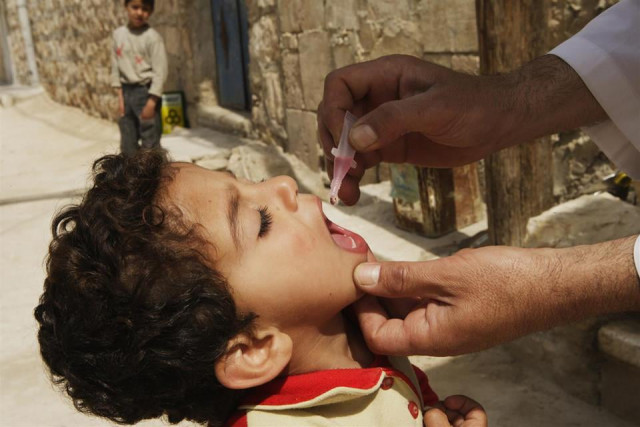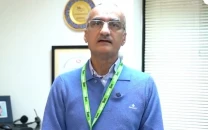Pakistan -- polio's breeding ground: report
Polio continues to flourish in Pakistan, presenting danger to other countries: Global Polio Eradication Initiative

The report comes weeks after Pakistan reported the highest number of polio cases in 14 years. This year so far, 220 cases have been confirmed, compared with 93 cases in the whole of last year, The Wall Street Journal reported.
Part of the strategic plan of the GPEI was to stop the transmission of the wild polio virus on a global level by the end of 2014. Being the major stumbling block in the eradication of polio, Pakistan has ensured that the global target will not be met, the report stated.
Polio continues to flourish in Pakistan and is now presenting danger to neighbouring countries and even further. The polio virus had already made its way into Syria and Iraq, with the most recent case in April 2014.
Pakistan is now viewed as a major hindrance to polio eradication and is also presenting itself as an ongoing threat to public health in other countries.

PHOTO: REUTERS
Pakistan maintains strong relations with key players within the region, such as Saudi Arabia, China and the United Arab Emirates and has the potential to put these alliances to good use, according to the report.
Talibani stronghold in North Waziristan, however, has been paramount to Pakistan’s battle in polio eradication, for the last two years at least, leaving a quarter of a million children unvaccinated.
These children are left unprotected and vulnerable by the government, making them the prime victims in this endemic. They are contributing to four-fifths of all the people in the world who are paralysed by the virus in 2014, the report further states.
There is a prevalence of attacks on polio teams countrywide which unveiled reasons as to why polio is out of control. Anti-polio campaigns are often bereft of security and protection due to which many campaigns have been postponed in recent months. This can be attributed to why fewer children are now being vaccinated than two years ago.
The report goes on to say that less than a quarter of vaccination campaigns assessed over the past 12 months have met the standard of 80% coverage.

PHOTO: REUTERS
Hundreds of millions of dollars have been spent on polio globally over the past 17 months, during which Pakistan has displayed inaction this regard. Other countries have demonstrated commitment, determination and unity to keep the virus at bay, the report maintained.
Despite the urgent nature of this endemic and an alarming rise in the number of polio cases reported in Pakistan, it took Prime Minister Nawaz Sharif six months to appoint an official responsible for polio and a funding plan for the eradication was only approved recently.
Protests in the capital city in recent months have kept the prime minister consumed resulting in his government delaying the reconstitution of the polio cell which was disbanded during the 2013 elections.
According to the report, Pakistan is now in dire need of an effective strategy headed by a modern and effective leadership structure which will dedicate resources to eliminate the virus in its entirety as this has been missing from Pakistan for at least two years and Pakistan now needs to make up for lost time.
Simple statistics

GLOBAL POLIO ERADICATION INITIATIVE REPORT 2014
The following is an excerpt from the GPEI report:
Compared to the same period a year ago, the amount of polio paralysis has increased five-fold in Pakistan, while across the rest of the world it has been reduced seven-fold. Even in its ‘low season’, Pakistan had more cases than the entire rest of the world.
Between July and September 2014, eight times as many children were paralysed in Pakistan than everywhere else put together.
If Pakistan had matched India’s performance of ridding its country of polio, only 35 people would have been paralysed by polio in the world this year.
Already standing out for all the wrong reasons, Pakistan’s unwanted status as the world’s major polio reservoir is now stark and deeply embarrassing for such a proud country.



















COMMENTS
Comments are moderated and generally will be posted if they are on-topic and not abusive.
For more information, please see our Comments FAQ